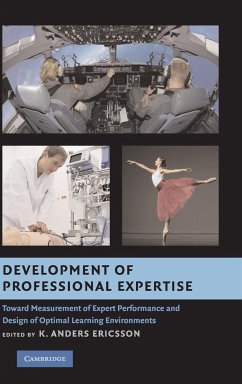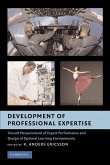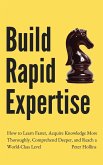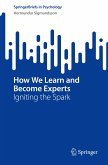Development of Professional Expertise
Herausgeber: Ericsson, K. Anders
Development of Professional Expertise
Herausgeber: Ericsson, K. Anders
- Gebundenes Buch
- Merkliste
- Auf die Merkliste
- Bewerten Bewerten
- Teilen
- Produkt teilen
- Produkterinnerung
- Produkterinnerung
This book is designed to provide the first comprehensive overview of research on the acquisition and training of professional performance.
Andere Kunden interessierten sich auch für
![Development of Professional Expertise Development of Professional Expertise]() Development of Professional Expertise57,99 €
Development of Professional Expertise57,99 €![Transition Expertise and Identity Transition Expertise and Identity]() Christopher ConnollyTransition Expertise and Identity119,99 €
Christopher ConnollyTransition Expertise and Identity119,99 €![Build Rapid Expertise Build Rapid Expertise]() Peter HollinsBuild Rapid Expertise18,99 €
Peter HollinsBuild Rapid Expertise18,99 €![Psychology in Professional Sports and the Performing Arts Psychology in Professional Sports and the Performing Arts]() Psychology in Professional Sports and the Performing Arts175,99 €
Psychology in Professional Sports and the Performing Arts175,99 €![The Oxford Handbook of Expertise The Oxford Handbook of Expertise]() The Oxford Handbook of Expertise155,99 €
The Oxford Handbook of Expertise155,99 €![Performance Psychology Performance Psychology]() Performance Psychology64,99 €
Performance Psychology64,99 €![How We Learn and Become Experts How We Learn and Become Experts]() Hermundur SigmundssonHow We Learn and Become Experts42,99 €
Hermundur SigmundssonHow We Learn and Become Experts42,99 €-
-
-
This book is designed to provide the first comprehensive overview of research on the acquisition and training of professional performance.
Produktdetails
- Produktdetails
- Verlag: Cambridge University Press
- Seitenzahl: 570
- Erscheinungstermin: 3. Mai 2016
- Englisch
- Abmessung: 235mm x 157mm x 38mm
- Gewicht: 1065g
- ISBN-13: 9780521518468
- ISBN-10: 0521518466
- Artikelnr.: 26056404
- Herstellerkennzeichnung
- Libri GmbH
- Europaallee 1
- 36244 Bad Hersfeld
- gpsr@libri.de
- Verlag: Cambridge University Press
- Seitenzahl: 570
- Erscheinungstermin: 3. Mai 2016
- Englisch
- Abmessung: 235mm x 157mm x 38mm
- Gewicht: 1065g
- ISBN-13: 9780521518468
- ISBN-10: 0521518466
- Artikelnr.: 26056404
- Herstellerkennzeichnung
- Libri GmbH
- Europaallee 1
- 36244 Bad Hersfeld
- gpsr@libri.de
1. The Measurement and Development of Professional Performance: An
Introduction to the Topic and a Background to the Design and Origin of this
Book K. Anders Ericsson, Ray Perez, David Eccles, Laura Lang, Eva Baker,
John Bransford, Kurt VanLehn and Paul Ward; Part I. Challenges in Past and
Contemporary Efforts to Measure and Train the Objective Performance of
Professionals: 2. The 20th Century Revolution in Military Training Ralph
Ernest Chatham; 3. Developing Professional Expertise with a Cognitive
Apprenticeship Model: Examples from Avionics and Medicine Susanne P.
Lajoie; 4. Leadership Development and Assessment: Describing and Rethinking
the State of the Art Michael D. Mumford, Tamara L. Friedrich, Jay J.
Caughron and Alison L. Antes; 5. Revolutions, Leaders, and Diagnosticians:
Reflections on the Themes in Chapters 2-4 Earl Hunt; Part II. Past and
Contemporary Efforts to Design Instruction, Train, and Maintain
Professional Performance: 6. Research on Past and Current Training in
Professional Domains: The Emerging Need for a Paradigm Shift Jeroen J. G.
van Merriënboer and Eddy W. Boot; 7. Designing Training for Professionals
Based on Subject Matter Experts and Cognitive Task Analysis Jan Maarten
Schraagen; 8. How to Help Professionals Maintain and Improve Their
Knowledge and Skills: Triangulating Best Practices in Medicine Dave Davis;
9. Advances in Specifying What Is To Be Learned: Reflections on the Themes
in Chapters 6-8 Richard E. Mayer; Part III. The Assessment and Training of
Skilled and Expert Performers in the Military: 10. Toward a Second Training
Revolution: Promise and Pitfalls of Digital Experiential Training Ralph
Ernest Chatham; 11. Evaluating Pilot Performance Brian T. Schreiber,
Winston Bennett Jr, Charles M. Colegrove, Antoinette M. Portrey, David A.
Greschke and Herbert H. Bell; 12. Contrasting Submarine Specialty Training:
Sonar and Fire Control S. S. Kirschenbaum, S. McInnis and K. P. Correll;
13. Training Complex Cognitive Skills: A Theme-Based Approach to the
Development of Battlefield Skills Scott B. Shadrick and James W. Lussier;
14. Structuring the Conditions of Training to Achieve Elite Performance:
Reflections on Elite Training Programs and Related Themes in Chapters 10-13
Robert A. Bjork; Part IV. The Development of Expertise and Expert
Performance: 15. The Influence of Learning Research on the Design and Use
of Assessment Eva L. Baker; 16. Acquiring Conceptual Expertise from
Modeling: The Case of Elementary Physics Kurt VanLehn and Brett van de
Sande; 17. Teaching for Expertise: Problem-Based Methods in Medicine and
Other Professional Domains Henny P. A. Boshuizen; 18. Enhancing the
Development of Professional Performance: Implications from the Study of
Deliberate Practice K. Anders Ericsson; 19. It Takes Expertise to Make
Expertise: Some Thoughts about Why and How and Reflections on the Themes in
Chapters 15-18 John D. Bransford and Daniel L. Schwartz; Part V. General
Discussion: 20. The Value of Expertise and Expert Performance: A Review of
Evidence from the Military J. D. Fletcher; 21. Expertise in the Management
of People: A New Frontier for Research on Expert Performance Susan E. F.
Chipman.
Introduction to the Topic and a Background to the Design and Origin of this
Book K. Anders Ericsson, Ray Perez, David Eccles, Laura Lang, Eva Baker,
John Bransford, Kurt VanLehn and Paul Ward; Part I. Challenges in Past and
Contemporary Efforts to Measure and Train the Objective Performance of
Professionals: 2. The 20th Century Revolution in Military Training Ralph
Ernest Chatham; 3. Developing Professional Expertise with a Cognitive
Apprenticeship Model: Examples from Avionics and Medicine Susanne P.
Lajoie; 4. Leadership Development and Assessment: Describing and Rethinking
the State of the Art Michael D. Mumford, Tamara L. Friedrich, Jay J.
Caughron and Alison L. Antes; 5. Revolutions, Leaders, and Diagnosticians:
Reflections on the Themes in Chapters 2-4 Earl Hunt; Part II. Past and
Contemporary Efforts to Design Instruction, Train, and Maintain
Professional Performance: 6. Research on Past and Current Training in
Professional Domains: The Emerging Need for a Paradigm Shift Jeroen J. G.
van Merriënboer and Eddy W. Boot; 7. Designing Training for Professionals
Based on Subject Matter Experts and Cognitive Task Analysis Jan Maarten
Schraagen; 8. How to Help Professionals Maintain and Improve Their
Knowledge and Skills: Triangulating Best Practices in Medicine Dave Davis;
9. Advances in Specifying What Is To Be Learned: Reflections on the Themes
in Chapters 6-8 Richard E. Mayer; Part III. The Assessment and Training of
Skilled and Expert Performers in the Military: 10. Toward a Second Training
Revolution: Promise and Pitfalls of Digital Experiential Training Ralph
Ernest Chatham; 11. Evaluating Pilot Performance Brian T. Schreiber,
Winston Bennett Jr, Charles M. Colegrove, Antoinette M. Portrey, David A.
Greschke and Herbert H. Bell; 12. Contrasting Submarine Specialty Training:
Sonar and Fire Control S. S. Kirschenbaum, S. McInnis and K. P. Correll;
13. Training Complex Cognitive Skills: A Theme-Based Approach to the
Development of Battlefield Skills Scott B. Shadrick and James W. Lussier;
14. Structuring the Conditions of Training to Achieve Elite Performance:
Reflections on Elite Training Programs and Related Themes in Chapters 10-13
Robert A. Bjork; Part IV. The Development of Expertise and Expert
Performance: 15. The Influence of Learning Research on the Design and Use
of Assessment Eva L. Baker; 16. Acquiring Conceptual Expertise from
Modeling: The Case of Elementary Physics Kurt VanLehn and Brett van de
Sande; 17. Teaching for Expertise: Problem-Based Methods in Medicine and
Other Professional Domains Henny P. A. Boshuizen; 18. Enhancing the
Development of Professional Performance: Implications from the Study of
Deliberate Practice K. Anders Ericsson; 19. It Takes Expertise to Make
Expertise: Some Thoughts about Why and How and Reflections on the Themes in
Chapters 15-18 John D. Bransford and Daniel L. Schwartz; Part V. General
Discussion: 20. The Value of Expertise and Expert Performance: A Review of
Evidence from the Military J. D. Fletcher; 21. Expertise in the Management
of People: A New Frontier for Research on Expert Performance Susan E. F.
Chipman.
1. The Measurement and Development of Professional Performance: An
Introduction to the Topic and a Background to the Design and Origin of this
Book K. Anders Ericsson, Ray Perez, David Eccles, Laura Lang, Eva Baker,
John Bransford, Kurt VanLehn and Paul Ward; Part I. Challenges in Past and
Contemporary Efforts to Measure and Train the Objective Performance of
Professionals: 2. The 20th Century Revolution in Military Training Ralph
Ernest Chatham; 3. Developing Professional Expertise with a Cognitive
Apprenticeship Model: Examples from Avionics and Medicine Susanne P.
Lajoie; 4. Leadership Development and Assessment: Describing and Rethinking
the State of the Art Michael D. Mumford, Tamara L. Friedrich, Jay J.
Caughron and Alison L. Antes; 5. Revolutions, Leaders, and Diagnosticians:
Reflections on the Themes in Chapters 2-4 Earl Hunt; Part II. Past and
Contemporary Efforts to Design Instruction, Train, and Maintain
Professional Performance: 6. Research on Past and Current Training in
Professional Domains: The Emerging Need for a Paradigm Shift Jeroen J. G.
van Merriënboer and Eddy W. Boot; 7. Designing Training for Professionals
Based on Subject Matter Experts and Cognitive Task Analysis Jan Maarten
Schraagen; 8. How to Help Professionals Maintain and Improve Their
Knowledge and Skills: Triangulating Best Practices in Medicine Dave Davis;
9. Advances in Specifying What Is To Be Learned: Reflections on the Themes
in Chapters 6-8 Richard E. Mayer; Part III. The Assessment and Training of
Skilled and Expert Performers in the Military: 10. Toward a Second Training
Revolution: Promise and Pitfalls of Digital Experiential Training Ralph
Ernest Chatham; 11. Evaluating Pilot Performance Brian T. Schreiber,
Winston Bennett Jr, Charles M. Colegrove, Antoinette M. Portrey, David A.
Greschke and Herbert H. Bell; 12. Contrasting Submarine Specialty Training:
Sonar and Fire Control S. S. Kirschenbaum, S. McInnis and K. P. Correll;
13. Training Complex Cognitive Skills: A Theme-Based Approach to the
Development of Battlefield Skills Scott B. Shadrick and James W. Lussier;
14. Structuring the Conditions of Training to Achieve Elite Performance:
Reflections on Elite Training Programs and Related Themes in Chapters 10-13
Robert A. Bjork; Part IV. The Development of Expertise and Expert
Performance: 15. The Influence of Learning Research on the Design and Use
of Assessment Eva L. Baker; 16. Acquiring Conceptual Expertise from
Modeling: The Case of Elementary Physics Kurt VanLehn and Brett van de
Sande; 17. Teaching for Expertise: Problem-Based Methods in Medicine and
Other Professional Domains Henny P. A. Boshuizen; 18. Enhancing the
Development of Professional Performance: Implications from the Study of
Deliberate Practice K. Anders Ericsson; 19. It Takes Expertise to Make
Expertise: Some Thoughts about Why and How and Reflections on the Themes in
Chapters 15-18 John D. Bransford and Daniel L. Schwartz; Part V. General
Discussion: 20. The Value of Expertise and Expert Performance: A Review of
Evidence from the Military J. D. Fletcher; 21. Expertise in the Management
of People: A New Frontier for Research on Expert Performance Susan E. F.
Chipman.
Introduction to the Topic and a Background to the Design and Origin of this
Book K. Anders Ericsson, Ray Perez, David Eccles, Laura Lang, Eva Baker,
John Bransford, Kurt VanLehn and Paul Ward; Part I. Challenges in Past and
Contemporary Efforts to Measure and Train the Objective Performance of
Professionals: 2. The 20th Century Revolution in Military Training Ralph
Ernest Chatham; 3. Developing Professional Expertise with a Cognitive
Apprenticeship Model: Examples from Avionics and Medicine Susanne P.
Lajoie; 4. Leadership Development and Assessment: Describing and Rethinking
the State of the Art Michael D. Mumford, Tamara L. Friedrich, Jay J.
Caughron and Alison L. Antes; 5. Revolutions, Leaders, and Diagnosticians:
Reflections on the Themes in Chapters 2-4 Earl Hunt; Part II. Past and
Contemporary Efforts to Design Instruction, Train, and Maintain
Professional Performance: 6. Research on Past and Current Training in
Professional Domains: The Emerging Need for a Paradigm Shift Jeroen J. G.
van Merriënboer and Eddy W. Boot; 7. Designing Training for Professionals
Based on Subject Matter Experts and Cognitive Task Analysis Jan Maarten
Schraagen; 8. How to Help Professionals Maintain and Improve Their
Knowledge and Skills: Triangulating Best Practices in Medicine Dave Davis;
9. Advances in Specifying What Is To Be Learned: Reflections on the Themes
in Chapters 6-8 Richard E. Mayer; Part III. The Assessment and Training of
Skilled and Expert Performers in the Military: 10. Toward a Second Training
Revolution: Promise and Pitfalls of Digital Experiential Training Ralph
Ernest Chatham; 11. Evaluating Pilot Performance Brian T. Schreiber,
Winston Bennett Jr, Charles M. Colegrove, Antoinette M. Portrey, David A.
Greschke and Herbert H. Bell; 12. Contrasting Submarine Specialty Training:
Sonar and Fire Control S. S. Kirschenbaum, S. McInnis and K. P. Correll;
13. Training Complex Cognitive Skills: A Theme-Based Approach to the
Development of Battlefield Skills Scott B. Shadrick and James W. Lussier;
14. Structuring the Conditions of Training to Achieve Elite Performance:
Reflections on Elite Training Programs and Related Themes in Chapters 10-13
Robert A. Bjork; Part IV. The Development of Expertise and Expert
Performance: 15. The Influence of Learning Research on the Design and Use
of Assessment Eva L. Baker; 16. Acquiring Conceptual Expertise from
Modeling: The Case of Elementary Physics Kurt VanLehn and Brett van de
Sande; 17. Teaching for Expertise: Problem-Based Methods in Medicine and
Other Professional Domains Henny P. A. Boshuizen; 18. Enhancing the
Development of Professional Performance: Implications from the Study of
Deliberate Practice K. Anders Ericsson; 19. It Takes Expertise to Make
Expertise: Some Thoughts about Why and How and Reflections on the Themes in
Chapters 15-18 John D. Bransford and Daniel L. Schwartz; Part V. General
Discussion: 20. The Value of Expertise and Expert Performance: A Review of
Evidence from the Military J. D. Fletcher; 21. Expertise in the Management
of People: A New Frontier for Research on Expert Performance Susan E. F.
Chipman.









